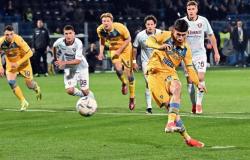Antonella Palmisano is the reigning Olympic champion of the 20 km race walktitle won in Tokyo, and in 2023 also achieved the world championship bronze medal in Budapest: the Italian gave an interview to OA Sports in which he spoke about the two races mentioned, the preparation towards the Paris 2024 Games despite the physical problemsnever completely behind us, and of new Olympic specialty of the mixed relaywhich in France will replace the men’s 50 km.
How did the winter preparation go? Have you finally managed to train without problems, or has the problem that has afflicted you in recent years reared its head from time to time?
“I’d tell you great, because I’m so far ahead compared to last year, considering that I had the operation at the end of September and that I started running my first 10km almost at the end of January. Today I tell you that, together with my team, my new coach and my historic physiotherapist Cristian Bruno, this year we have tried to take care of a fundamental aspect that last year, perhaps partly due to lack of time, we a little left out and in any case poorly done, which brings about a balance of strength between the lower right limb and the left limb, because there wasn’t enough balance, so even if the first part of the programming until November we dedicated it to the balance of strength, also to avoid running into new injuries, however already in January I had started with a good training load and today I am almost at the same level as I was in May last year with the quality of the work done. I find myself to be quite advanced, and I’m happy about this, because in any case the problem comes back, it’s now part of me, I didn’t expect something different to happen, because if an operation has managed to only improve what is mine symptomatology, however it recurred last year and I didn’t expect that this year it could disappear completely, so especially in these periods of more intense load, of more advanced training quality, however it returns and what I do better than before last year, it’s knowing how to manage it better, having the awareness that it’s there, but I continue to improve and train, to date I haven’t missed a single day of training, so this is very positive“.
Last year at the World Championships you reached the podium despite a troubled preparation. 100% do you think you can compete with the Spanish Perez?
“I had won a bronze, my opponent and also friend Maria Perez had arrived first, but it had been a troubled preparation and above all there was a lack of a lot of quality training, however the finishing needed to compete for that first place was missing, so I missed the jokes a bit finals. This year I think that by continuing in this way, therefore by continuing to train in this way, I could be able to play it all the way, to have all the necessary tools to be able to play for my Olympics to the end, and therefore also with Perez. We were also at a gathering in Spain, in January, where she was also there with the training group and her coach, but she comes from a post-World Cup injury, we couldn’t train together, but anyway she did a lot for me it’s good to go to a new place and above all to go to her place to see what her places are, and I’m happy about this, because for several years now we have exchanged the thought of training together several times, unfortunately we haven’t done it . I have a lot of respect for her: even after the operation, when I had bad periods, she was always present and close, she always wrote to me, so I was very pleased with their hospitality and a series of things that they do anyway well and that sport then gives you“.
How do you evaluate the mixed pairs relay format and what changes technically and physically compared to the traditional individual race?
“Despite having already done two relay tests, I can’t say I know this new format. I like it because it’s new, they are two short races, it’s not a long race, I like the fact that it’s a team race, where even that second that can make the difference is truly fundamental. But we still don’t know how to approach this relay in a concrete way, because the decision actually came a few months ago, and it’s not enough to know about a race. We don’t know how to approach it, whether with a strong start and an even stronger finish, whether we can still recover in those 40 minutes, and what type of recovery to do in the meantime. We are doing some tests, but we are not yet sure what the best thing to do is. The difference between an individual race and the relay is that an individual race is 20 km, while in the relay there is an exchange of athletes. It could be the relay done by me and Massimo Stano, the other Olympian, with a men’s start of 11.45 km, handover to the women for another 10 km, new handover to the men for 10 km, and then finishing with the woman for 10.75 km. This is the difference: there is an exchange of baton, but there are two athletes, and with a recovery interval of 40 minutes where, I repeat, it is still not clear what to do“.
What would it mean for you to compete in the Olympic pairs competition with your friend Massimo Stano?
“It’s definitely an inspiring relay, in the sense that we both won gold at the 2021 Olympics in Tokyo, so we both arrive as Olympic champions and we have this awareness, then being together, joining forces to try to win another medal, it’s what they both have in common, the same hunger and the same desire to win, to try once again and, why not, do it together. Even the fact of doing it with him, with whom I trained until last year, is a truly stimulating and beautiful thing for me, so, I repeat, we are both aiming to win for the second time“.
Do you think your triumphs at Tokyo 2020 have contributed to increasing the interest and practitioners of race walking, or does it remain a niche sport?
“I would like to be honest about this question. Immediately after the Olympics I must say that there were many messages in which they asked me for advice on how to approach race walking, many also thanked me because the children had approached this sport that they didn’t know before, and therefore I must say that there There was a boom in subscribers, in people who tried it, in people who had never seen it. Having brought not one, but two Olympic medals, the two most important, from this discipline, meant that at least in that period there was talk of race walking. There is regret and disappointment, given that we weren’t good, but I’m not talking about me, but about those who are perhaps above us, in continuing to talk about the march, to promote it, to show it, to include it in international contexts, or to show it more on our television stations, obviously also given the fact that we have been somewhat covered by other disciplines, which hasn’t helped us. It’s not that the gear has become a niche, but it has disappeared a bit again, so very little has been said about it. And although I was around after the Olympics, because I tried to carry on the ‘Marching with Antonella’ project by being present in as many schools as possible, and showing the kids what walking is, but also explaining to them that this reality of athletics, with the possibility at the beginning of the season to also make selections here in the Fiamme Gialle, where the kids can understand which discipline they are suited to. Although I have gone around carrying the march forward, and perhaps I actually did so until a month ago when I could, and when there is demand I still do it, in any case it is not enough, because the march always remains a little ‘ in the shadows, and therefore there is always a bit of disappointment on this, as on the fact that after two Olympic medals something could change, so there was a bit of disappointment and regret from this point of view“.
Your technical gesture should be taught to kids. Do you think that juries are too lenient towards other opponents, who seem to run?
“Regarding the issue of having to be explained to children, I have already answered in the previous question. As for the judges, I don’t think they are lenient, in the sense that in any case there are not a few judges who judge us, within a circuit and an important race, and it is too easy to blame them, who have to judge , and therefore consider that of the opponents an incorrect march. I repeat, there are many judges, and it may seem to those who are not so expert that they run, however this is not the case, otherwise they would be disqualified. Of course, perhaps it can be a little subjective, because the rule ‘what the human eye sees’ always applies, but, I repeat, it is not good for the movement to think that they judge badly, and therefore it is not good for the athlete to think one way either. thing like that“.
Will Paris be your last Olympics?
“I think so, because getting to Los Angeles would mean another four years anyway. I don’t know if it will be my last race, I would like to decide on this after Paris, because even after Tokyo I had thought about quitting, and instead here I am aiming to win another medal“.
After winning an Olympic gold, how did you find the motivation to keep going?
“We live on these emotions, on adrenaline and as long as your body and, above all, your mind, give you the possibility to continue and you have an inner strength that overcomes the desire to abandon, then it’s easy to put your shoes back on the next day . Such an important victory sparked something in me that I didn’t expect, so continuing to be hungry and feeling that emotion again led me to continue. I don’t know what I’ll do after Paris but, I repeat, it’s a thought I don’t have now, I’ll think about it later“.
What have injuries taught you?
“In these last ten years, the most important ones, where there have been many successes, there has been an evolution of the thought that injuries have left, caused or taught me. I’ve always had a problem, considering that there was also the year of Covid, so out of ten years, six years of problems are not few. There has been an evolution, because at the beginning perhaps I didn’t experience them well and I thought ‘Why me?’, and I tried to give myself an explanation for the fact that I thought I was fragile, that I was never up to par, instead today I say that I learned to accept the fact that I am different or more fragile than others, and therefore I became more aware of the fact that I had these injuries, that I had my problems, and that I just had to learn to live with them, or rather, from the problem find the strength. I saw in a problem more determination to face and achieve an objective, this has been my strength in recent years, even more accentuated now, I have been carrying this problem for three-four months before Tokyo, and three years have passed in which there was an operation in between. I’m learning to manage it, despite the bad moments, and this has become my strong point. The desire to continue, despite everything, to overcome my limits, despite a problem, to know how to get up and do something different from what could be normal and what could be easy. This is what injuries have taught me. Much more importantly, I accept that I am not the victim of the situation, because it is easy to take refuge behind a problem, always have an alibi and therefore not bring a result. What I told myself, and I learned to say, is ‘I have a problem, but I don’t want to be a victim, I have to overcome it even though it exists’, and this is also thanks to all the problems I’ve had in my career“.





